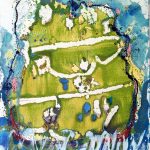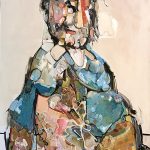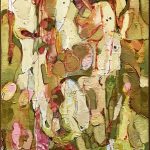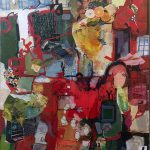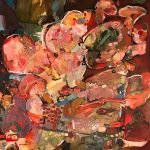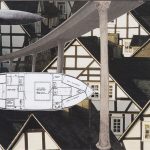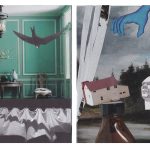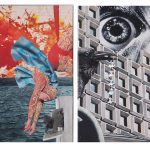Mary Margaret Makepeace Bonifacio, age 82, passed from this earth December 13, 1974. Mary-Maggie was know for her rapt affections for crewelwork, Perry Como, houseplants, and public television; and for her marinated five-bean salad. She leaves behind her only child, Salvio Bonifacio. No services will be held. Please do not visit Salvio, or call him on the phone. Please.
Salvio had wrestled with the wording of the thing, composing it in his mind even as the ambulance, red swirling lights turning the early morning frost hibiscus pink, carried his mother away. He had held her hand while he dialed the emergency number, feeling its coolness and knowing she was gone, wondering when it would turn wooden and stiff, wondering why he was calling at all for help, why it was necessary to involve the authorities, wondering if any droplet of her being remained inside the failed body, evaporating, condensing. Knowing he owed her this rightness.
He typed the obituary onto lined mint green paper that he found in the drawer of her vanity, wrote the required two-dollar check, and put both in an envelope, addressed to the newspaper, care of Deaths and Notices. Please. He did not want to shake hands with weepy, old strangers, did not need flowers brought to the house, did not want visitors perched at the edge of the yellow sofa, offering to do anything at all that might help him through this difficult time, laying out cold cuts (slices of dead bird rolled tight like fingers), sweating cheese, and knuckles of raw cauliflower on the sideboard. Please, he had typed. Please. Don’t.
One stamp in the desk drawer, one crack beneath the front door, just enough daylight for sending his message to the moon.
—
Three months gone, Mary-Maggie, one quarter of a year like a wedge of pie left malingering on the countertop. On the living room rug mail accrued, vomited through the tiny brass mouth, an ever-expanding peninsula of bills and notices and Chinese food menus, beneath those a reef of condolence cards.
Milk bottles festered on the porch, small, foamy stalagmites. For a time, neighbors had brought lasagna dinners and foil-shrouded banana loaves, setting them on the welcome mat when he declined to answer the door. Gleeful raccoons gorged, then mice upon the leavings, and roaches upon the final, microscopic remains.
Then: there was no more light, no electricity for the television, the can opener, the toaster. Cans of frozen orange juice loosed long, sticky tongues down the front of the Frigidaire. Fish sticks grew green fur. A group came, church folk, with rakes and garbage bags and pruners. One of them turned on a car radio, Merle Haggard, Loretta Lynn, whistled along, and hosed rot from the porch.
Another rang the doorbell, dark suit, bolo tie. Salvio, wrapped in the living room curtain, watched the man’s mustache, how it did not move while he talked, more than ninety days, your mother’s remains, not claimed, next of kin, Mr. Bonifacio you must answer this door, the mustache a bumper on a car, the guardrail on a terrifying curve. You have abandoned her, sir. Salvio stayed there, swaddled, until the dark suit went away.
And then Salvio took to his mother’s bed. He bid sweet sleep, as ever, to her jar of Pond’s cold cream, the green glass bottles of pills, the arrested clockwork of her oxygen tank, the porcelain shepherdess lamp (dim, but smiling).
He slept the kind of sleep that felt like falling into warm gravy, like a journey to the farthest place he could fathom, Saudi Arabia, or Tibet, like swimming all the way there and all the way back. Dreams grabbed at his ankles, slowing his strokes: faraway sounds of telephones, doorbells, bewildering questions from men in plaid suits and paisley ties, in striped suits and bowties the doorbell again, fists thumping against wood, Salvio, are you there, open the door, Salvio, I never promised you a rose garden, a droning near the front of his skull—then the sensation of being touched, of his mother’s thumb melting a blessing around and around into the skin of his forehead, Salvio, honey, wake up, a hovering that brought him to the surface, opened his eyes, lifted his hand to his brow.
She had touched him, he felt it. Then he remembered.
The ambulance, the neighbors peering out through their bedroom curtains, my good golly it’s Salvio, he actually came outside, it’s been years—decades, maybe, that poor man, I’d forgotten he lived there, how old would he be, fifty-five, sixty years old, the paramedic shaking his head, I’m very sorry, sir, the unhurried departure to—where? What had the ambulance driver said, where did she go? Morgue, mortuary? Mars? If not his mother’s hand, what, then, had he felt? Salvio sat up, fingering crust from his eyelids, wiping drool with the sheet’s embroidered edge. The only other being in the room, save Melinda Lee, his mother’s prized philodendron, sat atop a half-eaten cough drop, flexing its wings with some distress.
A bee, a honeybee (Apis, he recalled, mellifera, tatters of school Latin). Lucky he wasn’t stung, he thought, looking around the bed for a magazine to crush the pest. Finding nothing, he put his feet to the floor. Then he looked more closely, leaning over the bedside table. Pulsing its hind end, the poor thing labored to release its feet from the gummy Sucrets lozenge, each outsized effort producing a minute kazoo sound. Salvio had to respect the creature for trying so hard, for its frazzled industry. He admired the tidy subdivisions of its wings, the mustardy gold tucked into its leg sacs. Its banded abdomen reminded him of his mother’s hair, dyed dark molasses brown with bright, brassy stripes.
Free it, he decided. I will free this bee.
He found his mother’s magnifying glass, the one she used for crosswords back when she could still sit upright, and studied the problem. Force would sever its legs. He wanted to avoid that throbbing stinger, and not damage the wings. Submersion seemed unwise, as did melting the lozenge over flame. Dissolution, he theorized—yes, that might work.
Salvio mixed soapy water in the saucepan and borrowed a dropper from his mother’s ancient tincture of Merthiolate. He drizzled a gentle wash over the bee’s feet until, one delicate limb at a time, the little beast found liberty. The bee traced an astonished spiral above his head, finding a perch, eventually, upon one of Melinda Lee’s hoary leaves.
Tingles of comprehension passed through Salvio—the blessing on his forehead, the brown-and-yellow hairdo, the affinity for exotic foliage and throat remedies—his mother had not in death delivered to him a herald, a solemn, comforting seraph, but a smaller, less conventional envoy. She had sent a bee.
I understand, Mama, he said to the ceiling. I understand.
Bees lived in groups, in colonies. It would need to find its family, could not survive alone in this house, this he knew. None of the old Queen Anne’s windows opened, except the tiny attic porthole at which Salvio knelt as a child, spying as the neighbors around them drank, and gardened, and mated, so confident of their privacy. He could prop open the window and calmly herd the bee, using one of his mother’s head scarves to guide it from behind, upstairs and into the pre-dawn sky.
This was the time of day he’d always liked best, no furious lawnmowers, no bawling toddlers, no boys on skateboards riding past, laughing at the Bonifacios’ pigweed lawn, their balding roof. Earlier, even, than the milkman in his belching truck. He climbed the attic stairs, reaching into the dark for the handrail, swatting at cobwebs. Several days’ rain had swelled the wood, so Salvio kicked, hard, again, and yet again, throwing his right knee and shoulder into the place where knob met jamb. He felt bruises, small raisins of pain, germinate along his joints—proud evidence. He was saving his mother’s messenger.
When the door gave way, Salvio fell backward halfway down the steps, not from impact, not from relief. It was the aroma (unexpected, pleasant, like opening drawers full of cathedral candles, warm wax and a sweet musk) that pushed him, the novelty of it in a space that usually smelled of mice. Then, balanced once more, Salvio heard the sound: to call it a hum used too few letters—three insufficient to capture the carbonated rise and fall, otherworldly, circular, an incantation made of a million fractal notes. He shone a flashlight. The bee, his bee, his mother’s bee, joined her song to the one in progress, her wings to the turbulence of bodies in motion, thousands of them, fused by some alternate form of gravity around the crystal chandelier his mother had installed in the unused attic years ago. A ballroom, my darling Salvio, is what we shall have. They crawled over each other, obscuring the bauble completely, seeking purchase and contact, some flying free of the scrum to measure its sum total.
Their sound swelled and throbbed as he entered the space: let us out let us out let us out let us let us out out out. The huddle seemed to still itself as he tiptoed to the round window. A coterie of bees followed him, one of them colliding with his ear, the nape of his neck, prodding him on, hustle up, move it along, time is ticking (hadn’t his father once cuffed his head so, move it, son, have a purpose in this life for God’s sake). He dared not swat in response. Salvio wiped away brittle webs with his sleeve, swept to the floor a pepper of dead gnats. As his hands met the oak mullions, four glass panes tumbled to the bare dirt below, and the frame yelped wide into the cool morning vapors.
Behind him: acceleration, a stirring madness. As the bees took flight, Salvio flattened himself to the attic floor, breathing their collective zephyr. No air traffic controller could have choreographed such maneuvers, he thought, watching them spin lace from atmosphere while following some sort of ancient wiring. The exodus took many minutes and made a vibration he felt in the puzzle of his spine. A few stragglers clung to the chandelier, disoriented, or perhaps too spent to travel. Salvio found a stack of discarded old Reader’s Digests, and using January 1973 as a chariot, shuttled tired bees, one at a time, to the porthole. He tipped the magazine gently to the sill, depositing them in the dust.
Where had the hale among them gone? And which was his mother’s ghost? Salvio ran back down the steps to the second-story bay window. There, hanging from the old elm’s least frail branch, assembled in the shape of Africa, teeming and tangling about eight feet above the sidewalk, he saw them. A mammoth snarl turned rosy by a klieg of early sun—the bees looked like grapes, almost edible. He stomach railed. Salvio opened a can of pork’n’beans (fifty-seven left, plus the sauerkraut, the chutney, and twenty-eight jars of okra) with a hammer and screwdriver, grabbed a spoon, and returned to his observation point.
A lone bicyclist tossed newspaper capsules onto driveway tongues. Jacob Dilwell, to whom his mother once wrote monthly checks for two dollars and fifty-seven cents (plus a one-dollar tip and a thank-you note for feeding their paper through the mail slot), paused beneath the bees, set one meaty tennis shoe on either side of his green Schwinn, put his hands on his hips, and stared upward, jaw slacked. He took a rolled paper from his bag, lobbing a forehand at a few low-flyers. The mass shifted in shape (like a slumbering, tossing bear, Salvio thought, or an inflating airship). Jacob tried again, jumping, connecting with the swarm’s underside, and knocked a handful of bees a few feet toward the street. A hue and cry, a warning from the dark, changeling blur—less of a peninsula now, more a coiled, taut motherland—every set of antennae pointed upward, every poison dart deployed towards earth, toward the boy, the stupid, stupid boy.
Hey, he tried to shout at Jacob, palms flat against the glass hey, don’t, don’t do that, you will hurt them, stop that, stop it now, but all he produced was orange spittle. Hey. Hey, stop! Jacob swung his bike in a wide bend and circled twice before wiping some sweat from his fat neck and pedaling away.
Salvio made binoculars of his hands and scanned for casualties. A few bodies languished on the flagstone walk—stunned, dead? Magpies, a pair of them, arrived at the scene and pecked at the fallen. He smacked at the window with his hands and flailed, wheeling his arms to scare them away, a frenzied scarecrow, don’t eat them, don’t eat them, and startled Mrs. Montieth, who had just stepped outside to retrieve her paper. She reciprocated with a confused wave, and adjusted her housecoat’s closure.
It was the four of them—Salvio, the birds, and shower-capped Mrs. Montieth—who witnessed, seconds later, the specter of Jacob Dilwell standing atop the pocked chrome of his handlebars, tennis racket held to the heavens, being powered toward the swarm at impressive speed by a skinny-legged accomplice.
Just before the racket made contact with the bees, Jacob unthroated a bellow—the deep-belly bray of a Viking at pillage—and leapt from the bike into the elm’s crisp arms.
Detonation followed: within seconds a buzzing thickness obscured the houses across Alcott street and darkened an otherwise vivid May morning. Jacob Dilwell, armpit impaled upon the remains of a diseased branch, wore a fuzzy armor of furious honeybees.
The screaming, oh, the screaming. Had Jacob not flailed and thrashed, unleashing one shoe and a sprinkle of blood upon the shoulders of his minion, he might have remained in the tree for quite some time. Mrs. Montieth, who had raised five boys without the aid of their merchant marine father, positioned herself beneath Jacob and called out orders: Kick, boy, kick like hell, you hear?
Jacob did. He kicked the heel of his shoeless right foot against the willow’s trunk until, his supply of swear words exhausted, dropped to the asphalt and fainted.
Mrs. Montieth removed her shower cap and began wiping the insects from Jacob’s body, from her own arms, from the hills of his cheeks and forehead, batting as they dove and whined, as blood spread around them. Another neighbor (new, a car salesman, rumored to cultivate cannabis) arrived with his garden hose in tow and unleashed its pressure upon Jacob’s form. Mr. Toomey brought clean rags to press against the wounds; his basement tenant, an army reservist, took Jacob’s pulse. Someone dispatched the bicyclist to fetch Mrs. Dilwell, a school cafeteria cook. They, together, huddled over the calamity, hands in frantic concert, calling the boy’s name over and over again, shaking the lumps of his shoulders.
One bee, a solitary, wandering velvet diplomat, had visited Salvio, had come in peaceable confusion—and now this doom, this fracas. From the north arrived a keening ambulance, from the south, Jacob Dilwell’s plump mother and a quartet of younger siblings. Paramedics shoved aside the throng and scissored Jacob’s t-shirt away from his distended trunk. One medic hammered at the rising dough of his chest, the other breathed into his tumid mouth. Mrs. Dilwell, hands clasped over her own heart, nodded in time to the rescuers’ rhythm. On the curb, head slumped to his knees, sat the skinny boy.
From the window, Salvio counted thirteen people in his front yard, seven in the street, and four, that he could see, standing on the nearby corner. The number swelled by two when a local news reporter, cameraman in tow, exited a Channel 8 van. Mrs. Montieth courted local fame by recounting, directly into a satellite-shaped microphone, the velocity and amplitude with which Jacob Dilwell approached the tree, the force with which he pummeled the bees. She described his plunge from above, the sound (like a half-dozen stuffed turkeys hitting linoleum) he made upon impact. When asked to describe his current state she said: Oh, he’s bit half to death, you know, just plain bit to heck.
The number of vehicles expanded by one when Mr. Dilwell, a stonemason, settled his Dodge truck atop Mrs. Montieth’s juniper hedge and charged across the street. He bypassed his helpless wife, his son’s beleaguered body, the paramedics preparing for Jacob’s transport, and the reporter with her vanilla-custard hair. He clumped past Jacob’s friend, who (infectious, incurable idiocy, what was wrong with kids these days?) busied himself setting wounded bees aflame. Mr. Dilwell found his way to the Bonifacio’s front porch and threw his football fists against the screen, bellowing for Salvio’s audience: Goddammit, Bonifacio, come out here, come and see what your Wild Kingdom of a dump has done to my boy. Get out here and handle it like a man. I’ll have this property condemned. This has gone on long enough, by God. I know people, Bonifacio.
The mob’s energy attached itself to Mr. Dilwell and his demands. Salvio could not see his caller from the upstairs window, but felt in his metatarsals the man’s ire, his broad-backed vim. He did see the faces of at least two dozen bystanders (how the vicarious multiply themselves around tragedy) lift themselves to where he, framed by drawn-back lace curtains, peered right back down at them. Index fingers rose like missiles—the most scrutiny Salvio had endured since boyhood, since his father’s departure.
There he is, there’s Salvio, that’s him, his mother, she died around the holidays, I saw the ambulance, was it cancer, helluva thing, who knows, maybe she’d been gone for weeks, bad ticker, could be, ramshackle, destroying home values, strange lot they are, what a family, the father in prison all those years, died there in fact, you remember, the treasury scandal, embezzlement, never quite recovered, heart trouble, bedridden for ages, never let anyone help them out, crazy as billy goats, never mow the lawn, probably riddled with vermin.
Salvio backed away from the glass, from the speculations and truths. He heard the reporter at his front door: Mr. Bonifacio, could we have a word? Salvio, are you a beekeeper? How do you know Jacob Dilwell? Mr. Bonifacio? He feared faces at the parlor windows, at the kitchen door, hands rumbling the doorknobs, picking at the locks. He’d done nothing wrong, nothing at all, he was just a man in a house. Alone. How long before those doors gave way?
Sit, he needed to sit, to think calmly, to keep himself safe. He found the arm of his mother’s favorite chair, found the needlepoint seat, the upright comfort of its gilded back, and found those surfaces alive with bees. While he had watched neighborhood theater, a tragedy in three acts, his home had become a hive, a habitat. Across walls, around the phonograph’s mahogany cabinet, traversing a fern, flocking a plaster bust of the Blessed Virgin. Everywhere he could see, or touch, or step. How could so many materialize from one? In the kitchen, they’d found the overflow from a bloated can of corn, an apple core, the dregs of orange juice at the bottom of a glass. In his bathroom, they dabbed dainty feet to the backed-up drains and drank.
Salvio walked with care. Bees danced on the parquet floors, bees probed every window, bees sampled toothpaste, the ficus tree, the potpourri. Thousands and thousands of them, each a tiny soul.
More children gathered outside to hear the fresh legend called Boys Become Fools, and to bid Jacob’s ambulance swift passage. More parents came to lead them away from trouble, from the possibility of another monstrous swarm. The crowd moved to Mrs. Montieth’s lawn and quieted. Mr. and Mrs. Dilwell followed the ambulance in their flatbed Dodge.
Local news writers took photos, climbing through shrubs and over piles of bricks and rubble to photograph the Bonifacio’s home and the sickly elm. Onlookers described the scene to newer arrivals, pointing to the broken, bloodied branch, clusters of bees, the place where Jacob fell, explaining his fondness for dumb ideas and broken bones. The boy finds trouble. Always has, remember when he took a chainsaw to the fire hydrant?
By noon, there were no more stories to tell about Jacob Dilwell. Mrs. Montieth promised everyone she would be the point of contact for word of Jacob’s condition. The Channel 8 van departed for more emergent affairs.
Salvio watched a bee crawl in and out of his pajama sleeve. The sensation—feathery, benign—reminded him of a kitten he once held. He would not be alone as long as the bees lived here in the house with him. They would surround him with their chatter, their stirred air and primordial rituals. A beekeeper, him: a purpose for Salvio Robert Bonifacio.
The bees would need freedom, a fail-safe way in and out of the house. He returned to the attic with a hammer and a bread knife. Where daylight peeked through, Salvio chiseled at plaster, sawed at lathe. He worked a rusty golf club into cracks, and brought decayed shingles down upon his head. Then he stood back, satisfied. Roof and sky shared a generous maw.
Bees explored their new convenience and Salvio’s perspiring scalp. He unintentionally squashed one while swabbing himself, earning a stinging rebuke and a blazing, guilty headache. He would need protection to move easily among them. Duct tape strapped a lampshade to his head, and a lace tablecloth, draped over the shade and knotted between his legs, covered his most sensitive regions. He found work boots and tough leather gloves in the furnace room (should it smell faintly of egg in there?), and calamine lotion in the downstairs bath. When he stretched his arms wide, he felt moth-like, made of something holy.
As he moved from room to room, lord and keeper of this manor, bees took refuge on his veil. He found himself enjoying the weight of them—one felt like nothing, like the molecular zero of a single hair, but hundreds, together, became a chain mail that both endangered and guarded him. In the attic, beneath his mother’s chandelier, he tested a stiff foxtrot while the bees clung fast. In the parlor, he spun to what Chopin he could hum. He set out saucers of jam, and misted the houseplants with droplets of water for them to drink.
At five-thirty, he ate some pickles from a cracked jar, offering tastes to any interested bee. He read to them: excerpts from A Tale of Two Cities, and his mother’s favorite recipes (meatloaf au vin, almost everything au vin). At sunset, Salvio eased himself to the attic floor for sleep. Bees blanketed him with gold.
Superficial, childlike dreams followed, a slideshow of sensations and memories. Salvio dreamed of his mother making popcorn at the stove, the percussion of it, then the time he sat, as a toddler, for portraits at Sears (smile, darling, you are my sunshine) and cried at the flashbulb’s rude sparks. Arrows, when he was cupid in a play at school, then hailstones, the tingle of them on his arms, the orange fizz thrown by a campfire, the sparkle of ginger ale upon his chin. He dreamed of shouts that fell like stones, of jeering, of watching from the porthole window as other boys drove cars to girlfriends’ houses. Of his father’s cigars, of Independence Days.
He awoke to stars, to war.
Bits of brightness, all around—bottle rockets, their burning-candy smell, their small tongues of flame. He heard one scream, watched it duck into the attic through the hole he had made. Then another, and still more. One landed on his shroud, feeding itself on cotton and starch. Salvio smothered it with his gloved hands. Below, boys (Jacob Dilwell’s faithful) called out dark and vengeful oaths. Salvio stood, and stomped on a dozen eager fires.
Restive bees smelled smoke and anger, took to the air, made a sound Salvio had not heard before, like far-off bagpipes, wide and bottomless. He ran downstairs to the bay window, apologizing as he cut through clouds of them. He felt a sting at the back of his neck, another on his thigh. Panic made him enemy, foe.
In the street, a mob. Mr. Dilwell, braying, the boys trading playground epithets, feasting upon odium. Light another one, kids, keep them coming. We’ll make him come out face us, won’t we boys? That’s right, it’s about time. Think of Jacob, boys. Think of Jacob.
Salvio filled a bucket in the kitchen sink and ran to the attic. Much of it sloshed over the sides and onto the stairs, causing him to slip and blunt his knees. Staggering, squinting, he arrived at a conflagration gorging on boxes of old books and papers, nibbling at his mother’s chandelier. He doused himself with the remains of the water.
Fire was loud, he decided, the greedy roar of it larger than Mr. Dilwell’s noise. It was also beautiful, painterly, much more colorful at close range than expected—pale lemon when encountering new fodder, deepening to tangerine, then russet, and finally a violet blue as temperatures crested, as surfaces succumbed. He pressed one gloved hand over nose and mouth, awed. With the other, he drew circles in the smoke.
Below: the caw of fire engines arriving, the thin wheedle of squad cars. A megaphoned order to the crowd, desist, disband, though Salvio could not say if the words were meant for Mr. Dilwell’s militia, or for his own nation state.
Salvio took to the floor once more. He felt washed pure, thawed to his core. Goodness fell on him from above, amber, and thick. The rotted attic walls released themselves, nectar rained down. He licked his lips; the taste was sweet.
